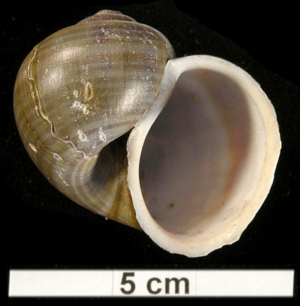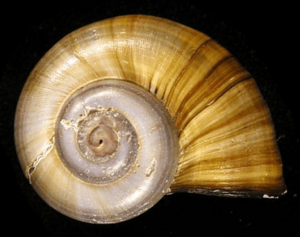Pomacea lineata facts for kids
Quick facts for kids Pomacea lineata |
|
|---|---|
 |
|
| Apertural view of a shell of Pomacea lineata | |
| Conservation status | |
| Scientific classification | |
| Kingdom: | |
| Phylum: | |
| Class: | |
| (unranked): |
clade Caenogastropoda
informal group Architaenioglossa |
| Superfamily: |
Ampullarioidea
|
| Family: | |
| Genus: |
Pomacea
|
| Subgenus: |
Pomacea
|
| Species: |
P. lineata
|
| Binomial name | |
| Pomacea lineata (Spix, 1827)
|
|
Pomacea lineata is a type of freshwater snail. It's also known as an apple snail because it belongs to the family Ampullariidae, which are often called apple snails. These snails live in water and have special body parts like gills to breathe underwater. They also have an operculum, which is like a little door that closes their shell opening.
Contents
Where It Lives
This snail species can be found in Brazil.
Life in the Ecosystem
The apple snail is a very important animal in the Pantanal wetlands. Scientists call it a "keystone species" because it plays a huge role in keeping the ecosystem healthy.
Dealing with Floods
Once a year, the Pantanal wetlands get flooded. When the water level goes down, the grass and other plants die and start to rot. As these plants decay, tiny living things called microbes use up all the oxygen in the shallow water. This makes it hard for most animals to breathe.
But the apple snail is special! Unlike other animals that break down dead plants, it has both gills and lungs. This means it can live in water with very little oxygen.
Snorkel Breathing
To get oxygen, the apple snail can stick a long tube, like a snorkel, up to the water's surface. It then pumps air into its lungs. This amazing ability lets them eat all the dead plant matter. They turn it into rich fertilizer that helps new plants grow.
Food for Others
These snails are also an important food source for many other animals in the Pantanal. They are a key part of the food web.
Human Uses
In some parts of Northeast Brazil, Pomacea lineata has been used in traditional medicine. People have used it to help with conditions like asthma, sprains, and skin problems.
See also
 In Spanish: Pomacea lineata para niños
In Spanish: Pomacea lineata para niños
 | Sharif Bey |
 | Hale Woodruff |
 | Richmond Barthé |
 | Purvis Young |



